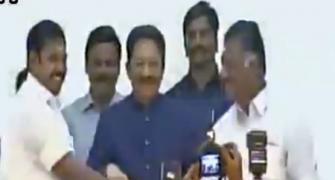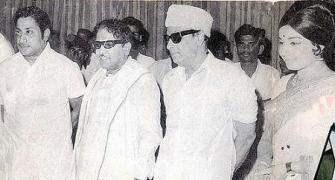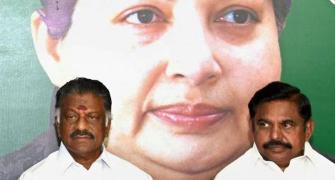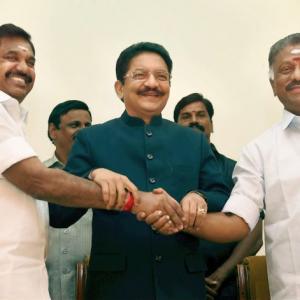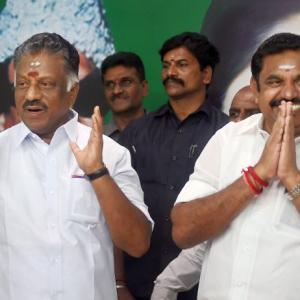The BJP’s national leadership seems to have convinced itself that with a weakened, post-Jaya AIADMK for company, they should be able to strike roots before long, and start by winning about 10-15 Lok Sabha seats in 2019, says N Sathiya Moorthy.

IMAGE: Tamil Nadu Chief Minister K Palaniswami greeting O Panneerselvam after he was sworn-in as deputy chief minister in the presence of Governor Ch Vidyasagar Rao at Raj Bhavan in Chennai on August 21, 2017. Photograph: R Senthil Kumar/PTI Photo.
In a day of high drama, two events as part of the ‘reunification’ of the ruling All India Anna Dravida Munnetra Kazhagam in Tamil Nadu on August 21, may have given their Bharatiya Janata Party’s game away -- or, so it seems.
One was the unprecedented and well-publicised congratulatory call of Prime Minister Narendra Modi to O Panneerselvam (OPS), three-time chief minister and now deputy chief minister after the reunification.
The other was the more than obvious give-away in Governor Ch Vidyasagar Rao linking the hands of OPS and Chief Minister Edappadi K Palaniswami (EPS), for a ‘family reunion’ photo op, in which he has nothing other than a formal role otherwise.
Media observers have mentioned both episodes to suggest that the combined message was as much to the T T V Dinakaran faction as to the other two, re-united groups.
PM Modi’s early congratulatory call to the late Chief Minister Jayalalithaa when only 20 per cent of the votes in the 2016 assembly polls alone had been counted is believed to have turned the public mood in her favour even before the party had obtained an absolute majority.
As the DMK-led rivals still point out, Jayalalithaa then felt emboldened to thank the Tamil Nadu voters and also throw open the doors for party cadres, businessmen and serving bureaucrats, some of them election officials at the time, to queue up before her Poes Garden residence, to congratulate her before it was seen as reluctant or being too late.
By the end of the day, returning officers in some constituencies suddenly stalled counting mid-way through, where the AIADMK’s rivals were supposedly having a marginal edge in vote-count. Some of the results went in favour of the ‘ruling party’, especially after the AIADMK had crossed the 118-seat cut-off figure in the 234-member assembly.
Some losing candidates have since contested the results before the Madras high court. Others, most especially former DMK Minister, A M Velu, came out victorious with a margin of 50,000 votes after the party threatened to take to the streets when the returning officer suspended counting when he was already 20,000 votes ahead.
The BJP’s desperation is marked by the conventional wisdom of the ‘national parties’ in ‘Dravidian’ Tamil Nadu, as also the ground realities, which the party leadership seems to be evaluating elsewhere in the country, too.
Be it the ruling Congress or the BJP at the Centre, in their time, both have come to hasty conclusions that they could end replacing one or the other of the ‘Big Two’ Dravidian parties when they were supposedly at the lowest, and strike deep roots in the state.
When the Congress dreamt of such a course, the party had still polled a combined 32 per cent vote-share between the two factions in 1971, and 20 per cent vote-share for the post-Kamaraj, re-unified Congress party in the post-MGR polls of 1989.
When the DMK was at its electoral weakest in the first half of the ’90s, post-Rajiv Gandhi’s assassination, the Congress’s calculations and machinations when P V Narasimha Rao was prime minister and party chief, too, did not help.
Conversely, the Congress has only continued to lose more votes, and its stand-alone committed votes could be less than five per cent.
As the most recent 2016 assembly polls have shown all over again, the loss of vote-share to the Congress or others has only benefited either the AIADMK or the DMK, and not certainly the BJP.
The BJP has a committed vote-share of only around two per cent, but both Vajpayee and Modi as prime ministerial candidates were able to take it up by another 5-7 per cent, but could not transfer it for the party in succeeding assembly polls.
Even the two per cent committed vote-share of the party is transferrable only to the AIADMK, and not to the DMK rival when they were allies in 1999, or to other regional partners like the Pattali Makkal Katchi, Marumalarchi DMK, et al, in individual constituencies, as was the case in 2014.
It is for this reason that the BJP leadership is keen on typing up with the AIADMK without a strong Jaya to drive a hard bargain for her party than try and woo the more stable DMK, under working president M K Stalin, otherwise in the rival Congress-UPA company, still.
Suffice to point out that PM Modi did find time to meet up with OPS even when he was the leader of a ‘minority’ faction within the AIADMK many times in the past months.
Against this, the PMO could not fix an appointment for Stalin, who is also the leader of the opposition in the state assembly, heading a 98-strong combine inside the House, even after he had sought time thrice in the past months, to discuss ‘people’s issues’ with PM Modi.
In a way, it was also Stalin’s way of ushering in political civility to ‘Dravidian’ Tamil Nadu, after mutually-adversarial leaders in Jayalalithaa and his bed-ridden father, M Karunanidhi, who were at daggers drawn vis-à-vis everyone and everything that the other represented in their time. Modi’s rebuff meant that the state may have lost out on a golden opportunity on that score.
Possibly behind the back of the state party, the BJP’s national leadership seems to have convinced itself that with a weakened, post-Jaya AIADMK for company, they should be able to strike roots before long, and start by winning about 10-15 Lok Sabha seats in 2019.
The ‘instructions’ for the state BJP is to continue flagging ‘people’s issues’ without commenting or committing the party on the internal affairs of the AIADMK. This was the same way the Congress high command conducted its state party affairs, before both lost out Tamil Nadu so very completely to the ubiquitous ‘national compulsions’ that do not hold any more even at the Centre.
The state BJP second-liners suspect that even when Jayalalithaa was openly and repeatedly asking the TN voters to ‘choose between Modi and the Lady’ in elections 2014, their leadership was in constant touch with the AIADMK at the highest levels.
They also point out that it would now be difficult for them to spread ‘Modi’s anti-graft message’ across the state after central agencies that raided power-centres in the Tamil Nadu ruling party, both during Jaya’s last days and more so afterwards, continue to look the other way whereas their leadership is seen as orchestrating the AIADMK split first, and reunification, since.
The message is clear. If the BJP leadership was behind the AIADMK split and could not succeed until it learnt from its mistakes and mended its tactics in favour of a purportedly well-considered strategy, the party needs to be aware of more pitfalls that may be before it, and those that it refuses to see with bare eyes.
Alternatively, if the BJP’s idea is to provide for possibilities of anti-incumbency impacting on election 2019 and forcing the need for a coalition government at the Centre, the better strategy for Tamil Nadu would be to keep poll options open between the AIADMK and DMK and negotiate with whoever may be required, if at all, post-poll.
If the third possibility is for the BJP to try and completely rout out the Congress rival at the national level than already, the party has nothing to lose but everything to gain, going by the party’s poor showing in 2014, with just 40 seats won in the 542-member Lok Sabha, but still retaining a relatively respectable 20 per cent vote-share at the national level.
Anyway, Tamil Nadu cannot become a part of any such tactic, where polarisation on religion and caste lines, cannot be influenced in ways other than under the ‘Dravidian model’.
The 1999 Lok Sabha polls after the ‘Coimbatore serial blasts’ still witnessed the losing combine in the state (headed by ruling DMK) winning the highest number of nine seats ever in a total of 39. Even among the BJP-NDA winners, very few obtained a substantial victory margin.
It is all in the future. But the ‘Dravidian past’ has shown that in Tamil Nadu, the weaker between the DMK and the AIADMK has always fallen back on a powerful national ally of the time, only to strengthen itself politically and electorally before marginalising the other.
That was the story of DMK under C N Annadurai in the ’60s, AIADMK founder MGR in the ’70s, Jayalalithaa in the ’90s, and so on. For the first time in the post-Independence era and otherwise, election 2016 saw the AIADMK winner and the DMK loser were divided by only a percentage point difference in overall vote-share, thus telling a different story, whose message needs to be studied and understood in full.
The fact is that even when the DMK was split in the ’70s and the Congress factions had a substantial share of votes, the intervening Emergency and the death of party strongman Kamaraj during the period ensured that the Congress’s votes shifted towards MGR and AIADMK, never to return.
Otherwise, too, the Justice Party forerunner of the pre-split DMK had contested elections and come to power as early as 1920 in what was then Madras Presidency, and the ‘nationalist’ Congress rival that contested the polls for the first time in 1937 and won, could not manage an absolute majority in the first post-Independence polls of 1952.
The rest, as they say, is history. History still teaches lessons, and those that want to learn them need to read the writing on the wall, which is clear -- rather than reading what is not there only because they want to read it that way.
N Sathiya Moorthy, veteran journalist and political analyst, is Director, Observer Research Foundation, Chennai Chapter.

